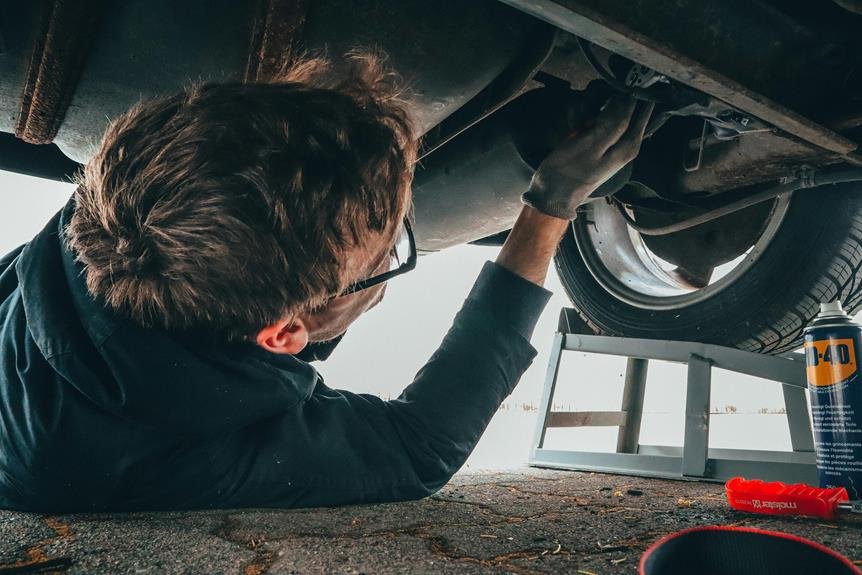
To keep your car running smoothly for a long time, make sure you get regular oil changes. This will help the engine function well, reduce wear and tear, and maintain performance. Checking tire pressure, rotating tires, and aligning them also ensures a safer drive. Don't forget to monitor fluid levels, inspect brakes, lights, and wipers, and check belts and battery terminals. These tips will help you maintain your car for longevity.
Regular Oil Changes
To ensure your car's engine operates smoothly and efficiently, it's crucial to regularly change the oil. Oil lubricates the engine, reducing friction between moving parts and preventing wear and tear. Over time, oil breaks down and becomes contaminated with dirt and debris, losing its effectiveness. By sticking to a routine oil change schedule as recommended by your vehicle's manufacturer, you can prolong the life of your engine and maintain optimal performance.
Changing your oil at the specified intervals helps remove sludge and contaminants that can build up over time. Fresh oil also helps to regulate engine temperature by absorbing heat and carrying it away from critical components. Neglecting oil changes can lead to increased engine wear, reduced fuel efficiency, and even engine failure.
Remember to check your vehicle's owner's manual for the recommended oil change schedule. It's a simple maintenance task that can have a significant impact on your car's longevity and performance. So, make sure to prioritize regular oil changes to keep your engine running smoothly for miles to come.
Tire Maintenance Tips
Properly maintaining your tires is essential for ensuring your vehicle's safety and performance. To keep your tires in top condition, regularly check the tire pressure. Underinflated tires can lead to decreased fuel efficiency and poor handling. Overinflated tires, on the other hand, can cause uneven wear and a rough ride. Use a tire pressure gauge to ensure your tires are inflated to the manufacturer's recommended levels.
In addition to monitoring tire pressure, it's crucial to inspect the tread depth. Worn-out treads can reduce traction, especially in wet or icy conditions. Insert a penny into the tread with Lincoln's head facing down; if you can see the top of his head, it's time to replace your tires. Rotating your tires every 6,000 to 8,000 miles can help distribute wear evenly and extend their lifespan.
Lastly, don't forget to align your tires regularly. Misaligned tires can lead to uneven wear and affect your vehicle's handling. By following these tire maintenance tips, you can ensure a safer and smoother driving experience.
Importance of Fluid Checks
Regularly checking your vehicle's fluids is crucial for maintaining optimal performance and preventing potential damage. Engine oil is like the lifeblood of your car, ensuring all moving parts are properly lubricated. Low oil levels can lead to increased friction and overheating, potentially causing engine failure.
Transmission fluid is another essential fluid to monitor. It helps with gear shifting and cooling the transmission system. Without proper levels, you may experience rough shifting or even transmission damage.
Coolant is responsible for regulating your engine's temperature. Insufficient coolant can result in overheating, leading to costly repairs.
Brake fluid is vital for ensuring your brakes function effectively. Low levels can compromise your ability to stop safely.
Lastly, power steering fluid makes steering easier. Neglecting this fluid can result in difficulty turning the steering wheel. By regularly checking and maintaining these fluids, you can prolong your car's lifespan and avoid unexpected breakdowns.
Routine Inspection Checklist
Are you confident that your car is in top condition for your next journey?
Regularly conducting a routine inspection checklist can help ensure your vehicle's longevity and performance.
Start by checking your tire pressure and tread depth to maintain optimal grip and stability on the road.
Inspecting your brakes is crucial for your safety – look out for any signs of wear such as squeaking or grinding noises.
Fluid levels, including oil, coolant, brake fluid, and windshield washer fluid, should be monitored and topped up as needed to prevent engine damage and ensure visibility.
Don't forget to examine your lights, indicators, and wipers to guarantee they're working correctly.
Additionally, inspecting belts, hoses, and battery terminals for signs of wear or corrosion can prevent unexpected breakdowns.
Lastly, listen for any unusual sounds while driving and address them promptly to avoid potential costly repairs.
Conclusion
By following these maintenance tips, you can ensure your car runs smoothly for years to come.
Remember to:
- Schedule regular oil changes
- Check your tire pressure and tread
- Monitor fluid levels
- Conduct routine inspections
Taking care of your car now will save you time and money in the long run.
Keep up with these simple tasks and your car will thank you with a long and reliable lifespan.




